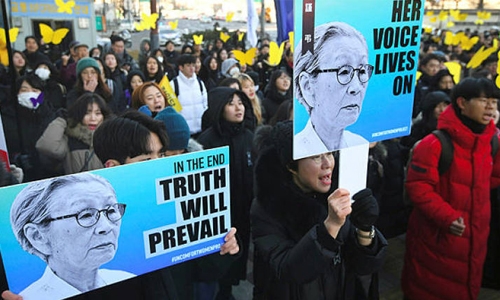Mourners honour one of last S. Korean WWII ‘comfort women’
Kim Bok-dong, who became a figurehead for the suffering endured by South Korean “comfort women” sexually enslaved by occupying Japanese forces in the Second World War, will be laid to rest yesterday. The 92-year-old was a symbolic figure for weekly rallies in front of the Japanese embassy that started in 1992, demanding a full, heartfelt apology from Tokyo for the horrific wartime abuse.
Kim, who died Monday of cancer, was only 14 when the Japanese military knocked on her parents’ door and requisitioned her for what they said was wartime work in a factory. Instead, she found herself on the battlefield in a brothel where soldiers had sex with her from morning until evening, every day for years -- one of tens of thousands of girls used as socalled comfort women by the Japanese military.
“It was sexual slavery, there’s no other word for it,” Kim told AFP in 2013. Hundreds gathered near the Japanese embassy on Friday, the culmination of a five-day commemoration of Kim, during which thousands visited the memorial altar set up at a Seoul hospital to pay their respects. Among the visitors to the altar was President Moon Jaein, who said in January Tokyo should take a “more humble” attitude to history.
Kim was one of as many as 200,000 women -- many Korean but there were victims from other parts of Asia too -- abused by Japanese soldiers, and the emotive issue has marred the relationship between South Korea and its former colonial ruler Japan for decades. Japan occupied the Korean peninsula from 1910 until its defeat at the end of World War II in 1945. But it was not until the early 1990s that the issue of comfort women came into the spotlight with the growth of the women’s rights movement in South Korea, and Kim was one of only a handful of survivors who ensured their abuse was not forgotten.
In 1993, Japan issued a formal apology but some politicians since then -- including Prime Minister Shinzo Abe -- have backtracked and caused outrage by questioning whether the girls were really forced into prostitution. In 2007, Abe triggered a region-wide uproar when he said there was no evidence that Japan directly forced women to work as sex slaves.
Related Posts

